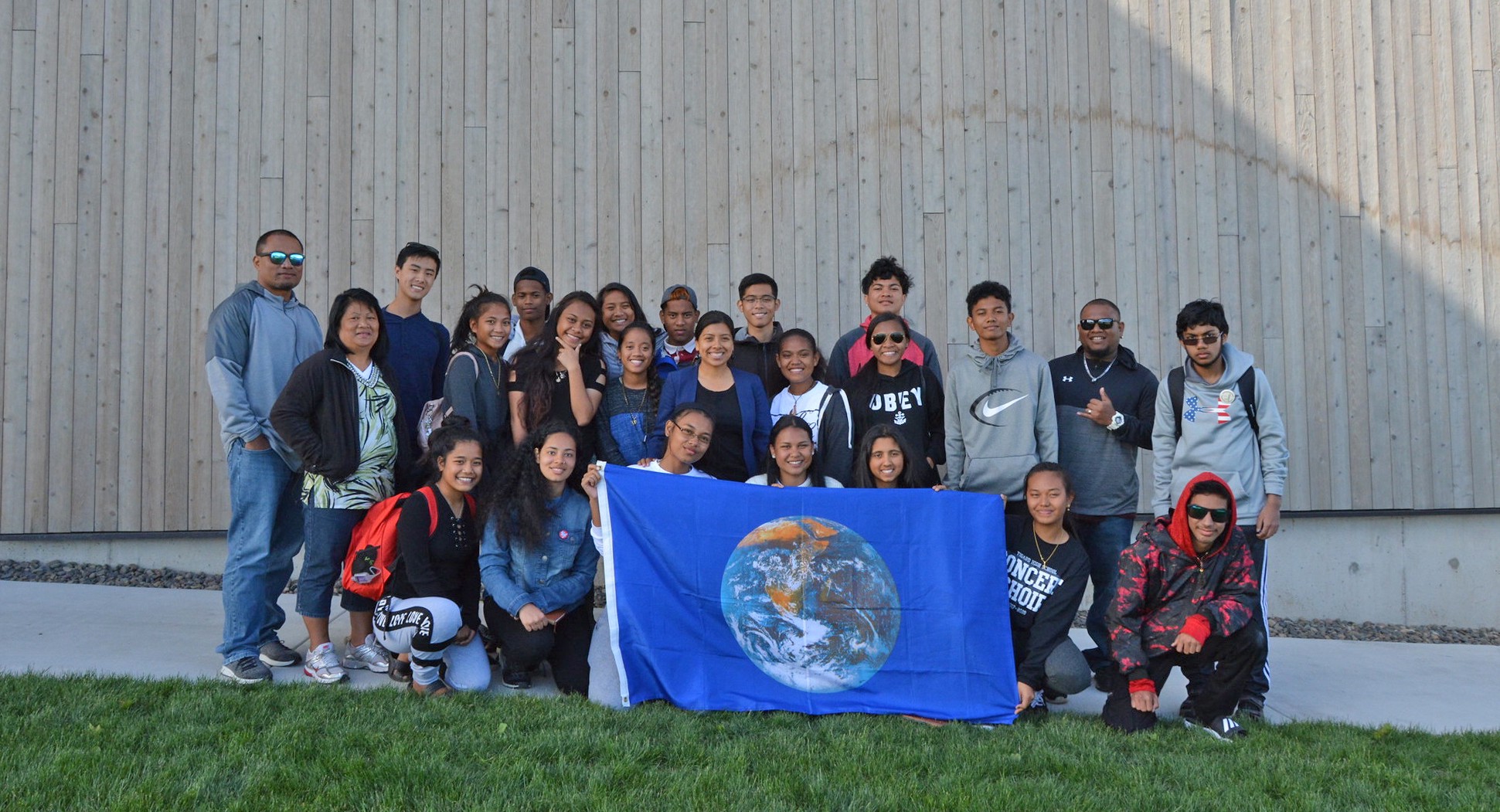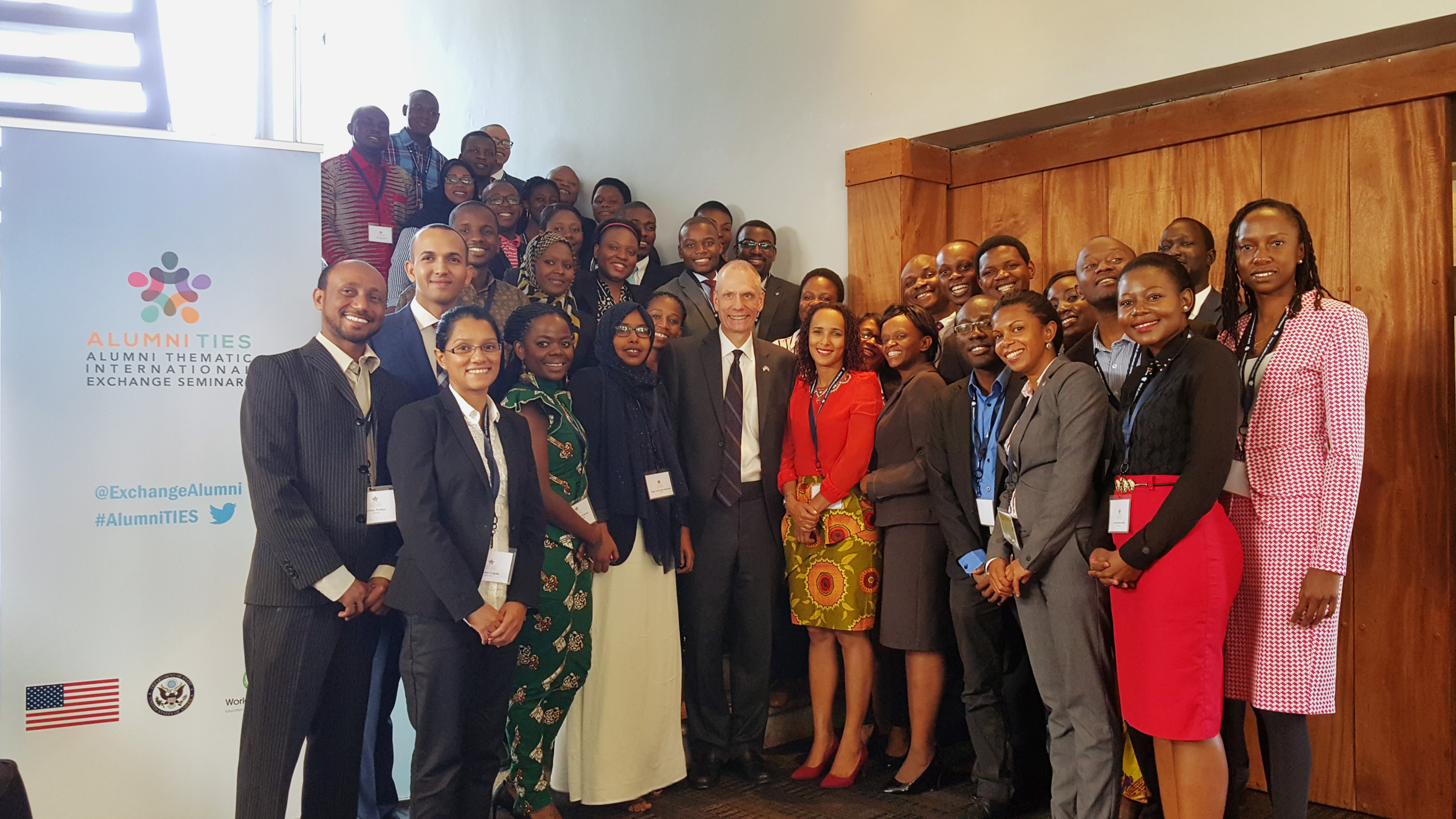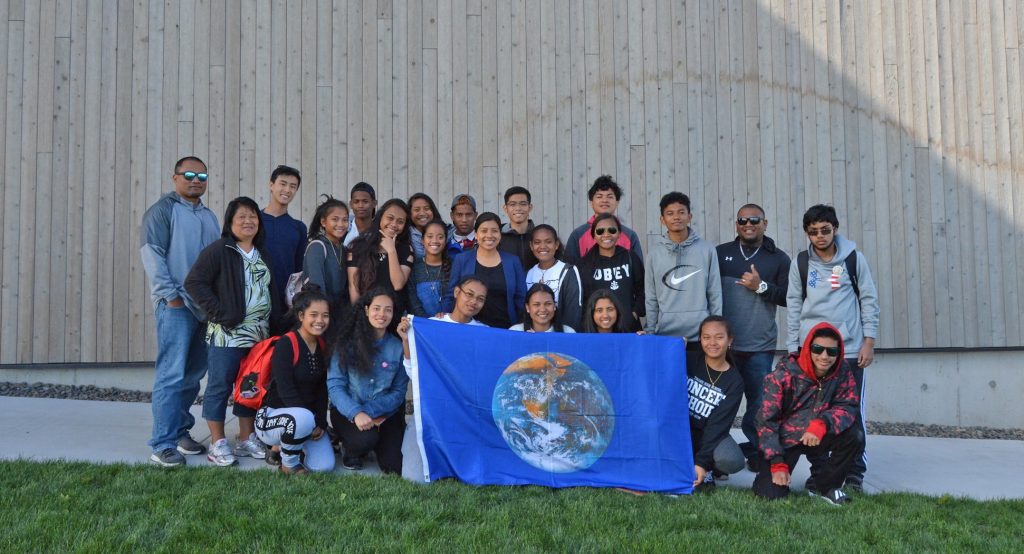
September 4, 2020 — At a time when many around the world are disconnected from their family, friends, and larger community because of the COVID-19 pandemic, a group of high school students from the Freely Associated States of Micronesia and the United States are bridging the Pacific Ocean through their shared dedication to ocean conservation.
Only a year ago, these students were strangers. Today, they are jointly seeing through a plan to get youth in their communities involved in ocean conservation and climate advocacy through an international network of environmental clubs.
This story begins, in part, in June 2019 when a group of 20 students from the Federated States of Micronesia, the Republic of the Marshall Islands, the Republic of Palau, and the United States — along with three adult mentors — came together to participate in an exchange in Portland, Oregon, focused on ocean sustainability and partnerships through the On-Demand Youth Leadership Program.
The program, sponsored by the the U.S. Department of State’s Bureau of Educational and Cultural Affairs (ECA), supports these substantive, three-week exchanges throughout the United States, as well as follow-on activities in the home countries of the international participants, to promote youth leadership development and civic engagement. World Learning has been assisting in the program’s implementation since 2012.
In the current cycle, the exchanges explore themes put forward by U.S. embassies globally and they are conducted through World Learning’s implementing partners, with the aid of World Learning. In Oregon, the “Tuna Diplomacy” exchange was carried out by WorldOregon, a Portland-based nonprofit.
Students applied to the program for a variety of reasons. One student from the Republic of the Marshall Islands, Bolden Elanzo, was drawn in by the name. Elanzo knew that overfishing was one of the biggest environmental issues faced by his country and saw the exchange as a chance to learn more and help address this challenge. He says that fish, specifically tuna, is one of the most important goods his country generates revenue from, as well as an essential part of his island’s culture since his ancestors’ early days.
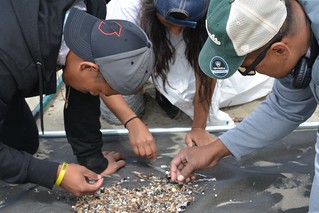
Nayantara Arora, a participant from Portland, says that she was eager to combine her passion for science and the environment with her interest in global affairs. She had gained experience advocating for environmental issues as an intern studying urban canopy’s effect on particulate matter and contextualizes her advocacy within the climate crisis, saying that environmental issues are at the forefront of her generation’s attention.
Other students describe being driven to apply after witnessing environmental problems directly in their communities — like invasive species and pollution — and seeing the opportunity to grow as leaders. Mayren Wichep, a participant from the Federated States of Micronesia, saw the need for change while taking part in an environmental cleanup at a popular swim site on her island.
She says that despite the difficulties they were able to finish the cleanup, collecting a truckload of trash, only to find that the next day the tide had brought back in more trash.
A Lightbulb Moment
The students’ idea for environmental clubs was sparked from a whirlwind of activity. In Oregon, they met with local organizations working to preserve the ocean and ocean-based livelihoods — from community initiatives like the Newport Fishermen’s Wives to Seattle-based Vulcan, Inc., a company leveraging satellite imagery and data-analysis to combat ocean destruction.
They also went on excursions to better understand the science behind ocean health and the ocean’s place in local cultures — from an overnight at the Oregon Coast Aquarium to a morning at the Yaquina Head Lighthouse and tidepools, which has guided ships along the West Coast since 1873.
“This along with other outings and meetings helped me connect better with my peers, both international and local,” says Ragheeb Hoque, a U.S. participant, who describes the lighthouse visit as his favorite memory from the exchange. “From that interaction, I grew as a person, coming out of my shell and learning that I could bring my perspective to the table.”
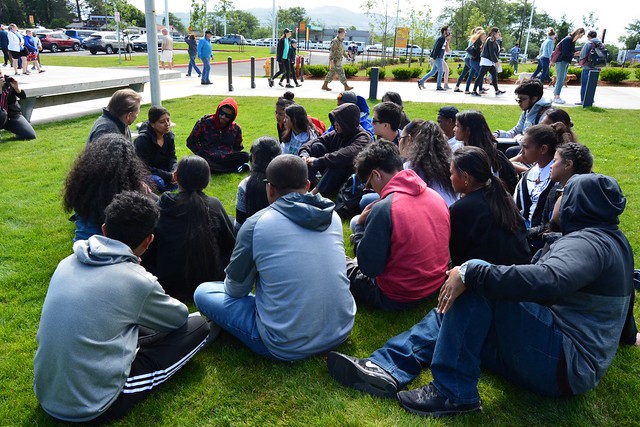
Throughout the exchange, the students reflected on their experiences together and took turns holding leadership roles. They quickly became friends too, bonding over games of charades and the close quarters of their cabin housing.
As the U.S. exchange concluded, they were given a final assignment: to develop community projects to implement in their local communities. These projects are a key feature of all On-Demand programs and help students bring what they have learned beyond the three weeks of the exchange.
But at first the students found this assignment extremely difficult. Many project ideas seemed too large or complicated, and the students were uncertain they would be able to continue them individually. They worked late into the night brainstorming, before finally returning to their cabin, exasperated and ready for sleep.
Just then, a lightbulb went on. They could all do one project.
“We all have these different ideas, but we’re working towards one goal,” says Arora, describing their realization. “What if we unite and try to make this organization where we can all draw inspiration from each other and help each other?”
The idea rapidly picked up speed, and the next morning they found ways they could connect their projects and complete them together through local clubs. ITUNA, or “International Teens Upholding Nature Association,” was born.
ITUNA Takes Shape
Since then, the students have been working to turn their vision for the ITUNA clubs into reality. From ITUNA’s creation, they have been determined that each local club should decide what will benefit its community the most.
This commitment has generated diverse projects. Some clubs focus on community education, and present to local high schools on sustainable fisheries and the importance of sustainability; while others host beach and environmental cleanups; organize strikes and marches to bring awareness of climate change and overfishing; and coordinate tree-plantings.
It has not been without its challenges, but through meetings in-country and monthly Facebook messenger calls, the students ensure ITUNA perseveres, and across the Pacific the students have inspired other high schoolers to join their cause.
In June 2020, the Tuna Diplomacy group reunited again — this time, virtually — for a follow-on conference to further their learning and reflect on how far they have come. Originally scheduled to take place in Palau in parallel with the internationally renowned Our Ocean conference, the conference was adapted by WorldOregon to a four-day virtual format in light of the global COVID-19 pandemic.
Though not the initial plan, the virtual format allowed speakers to attend who could not otherwise. The virtual format also meant that new ITUNA members could join and grow from the conversation.
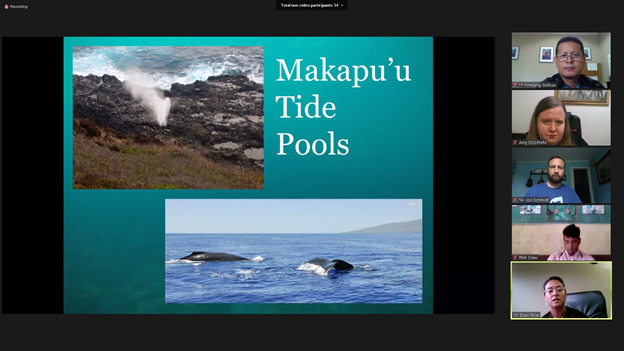
One speaker, Elsei Tellei, a communications and outreach professional with the Palau International Coral Reef Center, emphasized the necessity of empathy in conservation work — something that seems intuitive to the ITUNA students. Tellei says that it is paramount conservation efforts consider the lived experiences of communities, how everyday people use the ocean, for solutions to be long-lasting and equitable.
During the conference, Elanzo opened up about his own experience with the ocean. Specifically, how the geography of his island has instilled his community’s special connection to the ocean; from his ancestors to today.
“If you stand in the middle of the island, if you look to your right you can see the lagoon side, and if you look to your left you can see the ocean side. We don’t have mountains, and we don’t have valleys,” Elanzo remembers sharing. “Outsiders that come in, they feel scared because they always think to themselves ‘if there is a tsunami or a flood came in, where will we go?’. But our culture, pretty much depends on the ocean. That’s what gives us hope, because we depend on the ocean and we’re not supposed to be scared of it.”
The ITUNA members, new and old, say that it was especially moving to hear the experiences of their peers. Arora says that although she was open minded going into the conference, through hearing these stories she realized the severity of the issues on the islands. Beaches that are known to attract tourism have plastic from other countries washing up on their shores and the impacts of climate change are already visible.
“There was someone from the Marshall Islands who said that he can remember when the ocean didn’t reach up to their streets and it didn’t come to their doorstep — like that’s a noticeable change that he has seen over the course of his lifetime,” says Arora.
Like Tides Elevating All
The need for local and international partnerships in addressing these issues remains pressing. Another island nation, Mauritius, is currently combatting a devastating oil spill after a Japanese tanker ran aground near a marine park to its southeast. Tellei says that for people deep in the work of ocean and environmental conservation, it is easy to feel that they are lone actors against an inevitable and overwhelming threat, and that staying connected with her own peers has vital.
Though the ITUNA clubs have faced new trials in sustaining their connection through the COVID-19 pandemic, they continue to adapt, meet online, and push forward.
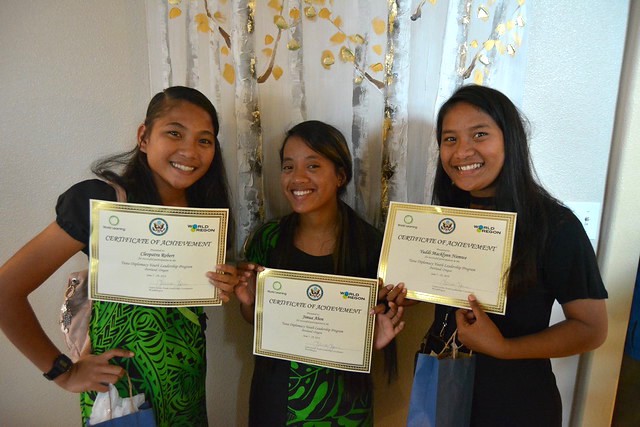
“The pandemic has definitely affected the capability and capacity of our ability to do what we need to do as ITUNA, but as long as we all continue to work towards the same goal, I believe we’ll do just fine,” says Wichep.
Before the students ever arrived in Oregon, Debra Toribiong, a public diplomacy specialist for the U.S. Embassy in Palau, first rallied the other U.S. embassies of the Freely Associated States to secure the On-Demand Youth Leadership Program offered by ECA around the theme of “our ocean.”
She sees these young leaders as the future ancestors of ocean resource management and developmentand believes that in lifting up these students and connecting them to a shared goal, like a tide, they will achieve a future that elevates all.
Indeed, this story continues because the students sustain their connection to each other.





